Corporate Governance Analysis: Globalizing World Perspectives
VerifiedAdded on 2023/06/10
|14
|3591
|215
Essay
AI Summary
This essay delves into the complexities of corporate governance within a globalizing world, examining the potential risks associated with employee representation on company boards. It analyzes arguments presented in a newspaper article regarding the Australian Council of Trade Unions Congress (ACTU) resolution, highlighting concerns about moral hazards, confidentiality breaches, and conflicts of interest. The essay explores corporate governance issues, such as the impact on strategic discussions, the potential for information leaks, and the challenges of maintaining command structures. Relevant theories, particularly stakeholder theory, are applied to the issue, emphasizing the need for directors to act in the best interests of all stakeholders and maintain the integrity of the board. The essay concludes by underscoring the importance of balancing various interests and upholding fiduciary duties in a globalized business environment.
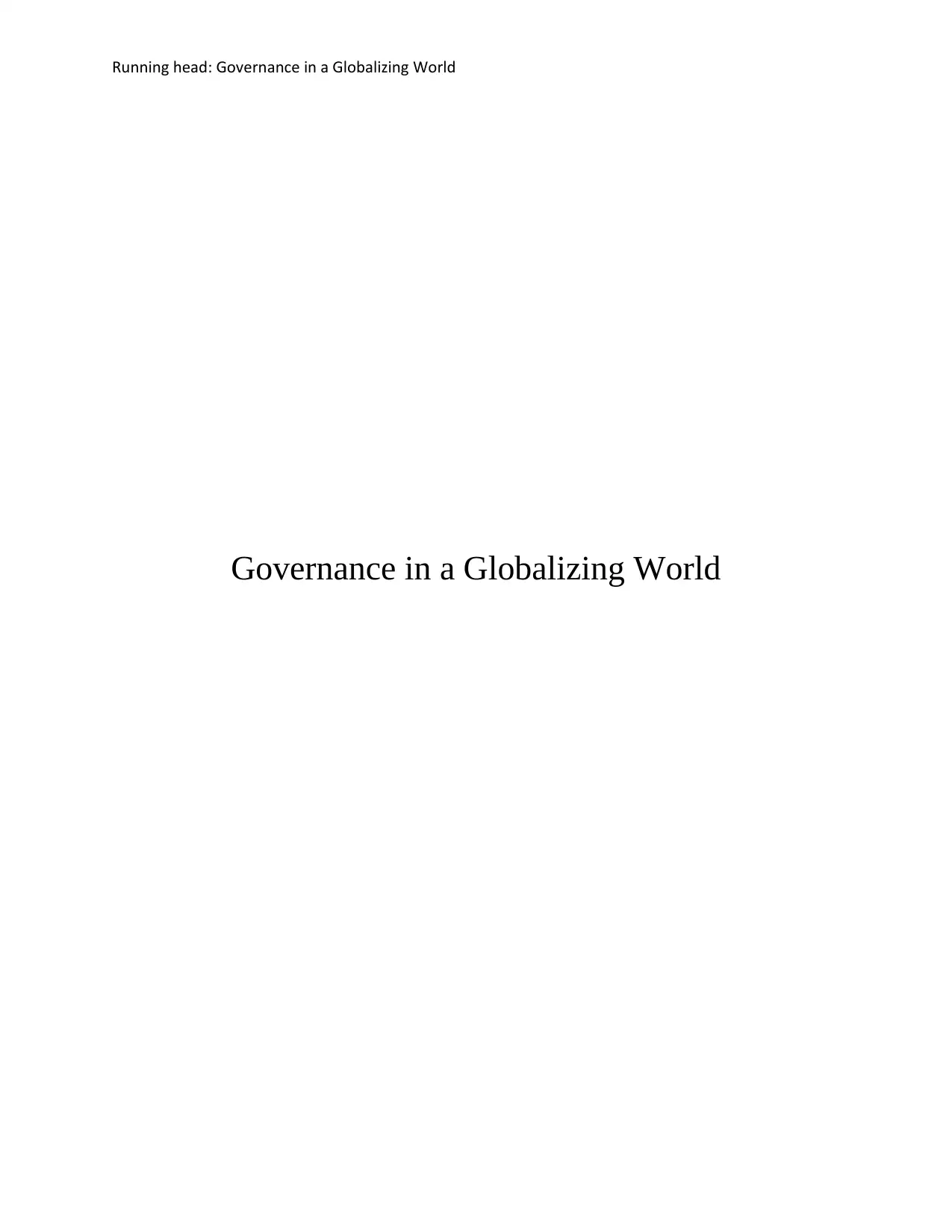
Running head: Governance in a Globalizing World
Governance in a Globalizing World
Governance in a Globalizing World
Paraphrase This Document
Need a fresh take? Get an instant paraphrase of this document with our AI Paraphraser
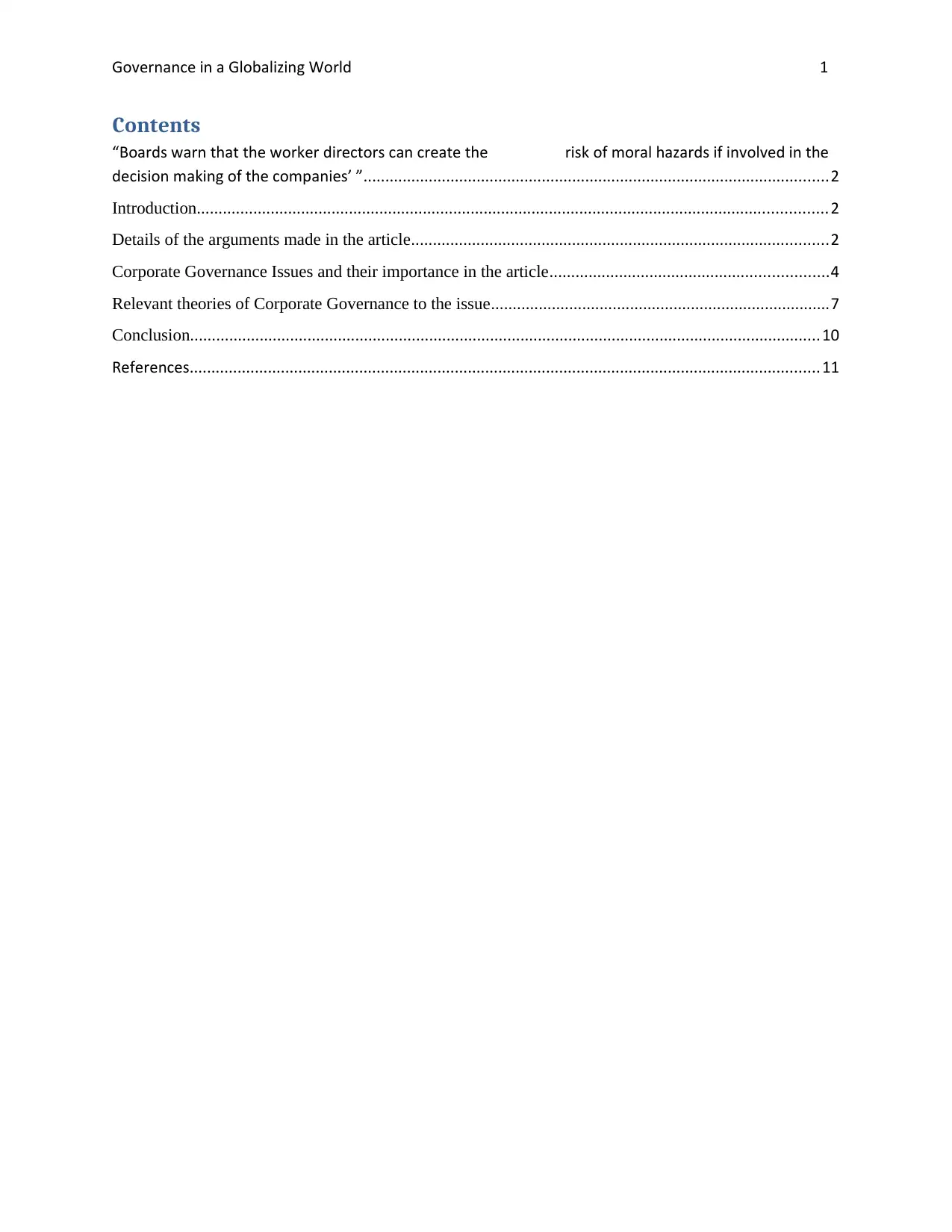
Governance in a Globalizing World 1
Contents
“Boards warn that the worker directors can create the risk of moral hazards if involved in the
decision making of the companies’ ”...........................................................................................................2
Introduction.................................................................................................................................................2
Details of the arguments made in the article................................................................................................2
Corporate Governance Issues and their importance in the article................................................................4
Relevant theories of Corporate Governance to the issue..............................................................................7
Conclusion.................................................................................................................................................10
References.................................................................................................................................................11
Contents
“Boards warn that the worker directors can create the risk of moral hazards if involved in the
decision making of the companies’ ”...........................................................................................................2
Introduction.................................................................................................................................................2
Details of the arguments made in the article................................................................................................2
Corporate Governance Issues and their importance in the article................................................................4
Relevant theories of Corporate Governance to the issue..............................................................................7
Conclusion.................................................................................................................................................10
References.................................................................................................................................................11
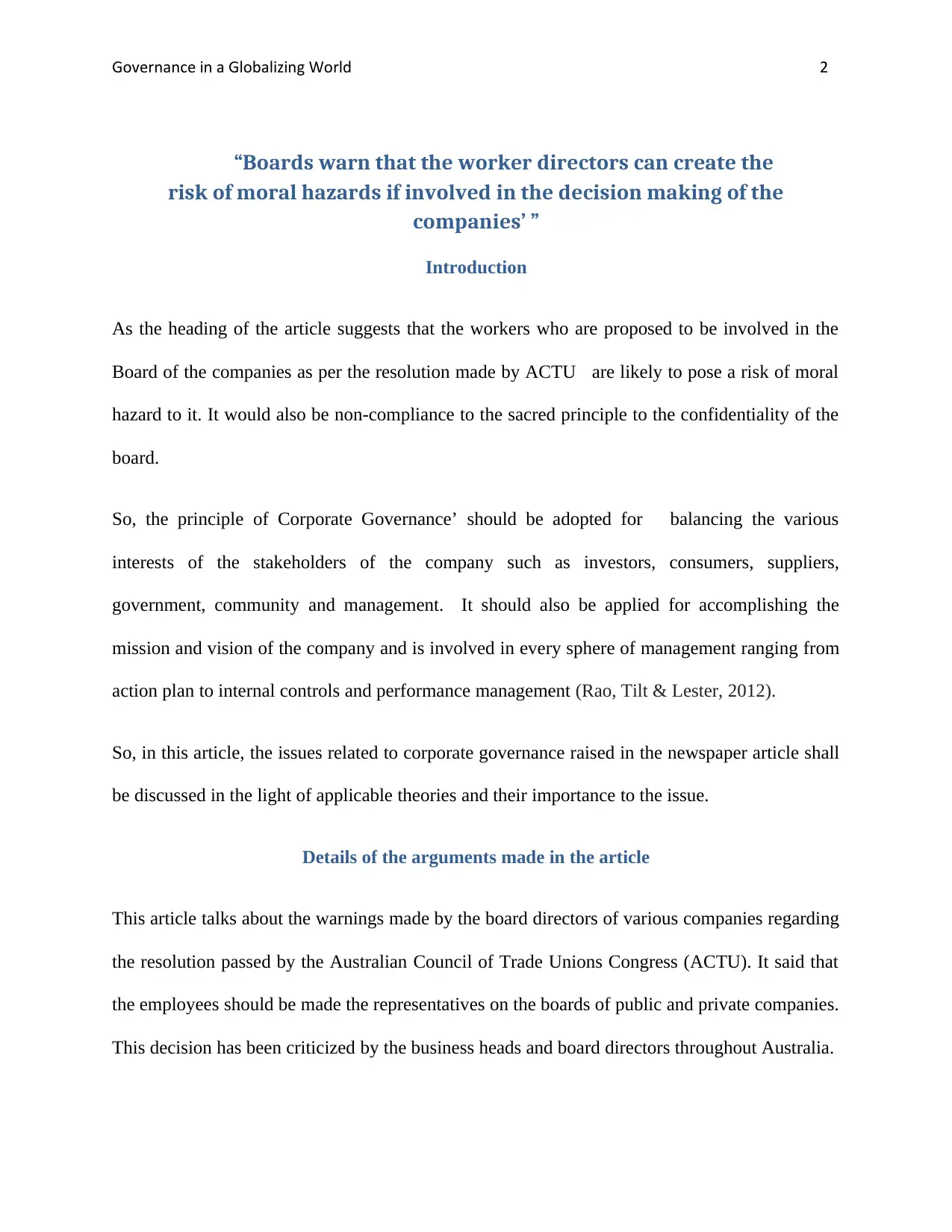
Governance in a Globalizing World 2
“Boards warn that the worker directors can create the
risk of moral hazards if involved in the decision making of the
companies’ ”
Introduction
As the heading of the article suggests that the workers who are proposed to be involved in the
Board of the companies as per the resolution made by ACTU are likely to pose a risk of moral
hazard to it. It would also be non-compliance to the sacred principle to the confidentiality of the
board.
So, the principle of Corporate Governance’ should be adopted for balancing the various
interests of the stakeholders of the company such as investors, consumers, suppliers,
government, community and management. It should also be applied for accomplishing the
mission and vision of the company and is involved in every sphere of management ranging from
action plan to internal controls and performance management (Rao, Tilt & Lester, 2012).
So, in this article, the issues related to corporate governance raised in the newspaper article shall
be discussed in the light of applicable theories and their importance to the issue.
Details of the arguments made in the article
This article talks about the warnings made by the board directors of various companies regarding
the resolution passed by the Australian Council of Trade Unions Congress (ACTU). It said that
the employees should be made the representatives on the boards of public and private companies.
This decision has been criticized by the business heads and board directors throughout Australia.
“Boards warn that the worker directors can create the
risk of moral hazards if involved in the decision making of the
companies’ ”
Introduction
As the heading of the article suggests that the workers who are proposed to be involved in the
Board of the companies as per the resolution made by ACTU are likely to pose a risk of moral
hazard to it. It would also be non-compliance to the sacred principle to the confidentiality of the
board.
So, the principle of Corporate Governance’ should be adopted for balancing the various
interests of the stakeholders of the company such as investors, consumers, suppliers,
government, community and management. It should also be applied for accomplishing the
mission and vision of the company and is involved in every sphere of management ranging from
action plan to internal controls and performance management (Rao, Tilt & Lester, 2012).
So, in this article, the issues related to corporate governance raised in the newspaper article shall
be discussed in the light of applicable theories and their importance to the issue.
Details of the arguments made in the article
This article talks about the warnings made by the board directors of various companies regarding
the resolution passed by the Australian Council of Trade Unions Congress (ACTU). It said that
the employees should be made the representatives on the boards of public and private companies.
This decision has been criticized by the business heads and board directors throughout Australia.
⊘ This is a preview!⊘
Do you want full access?
Subscribe today to unlock all pages.

Trusted by 1+ million students worldwide
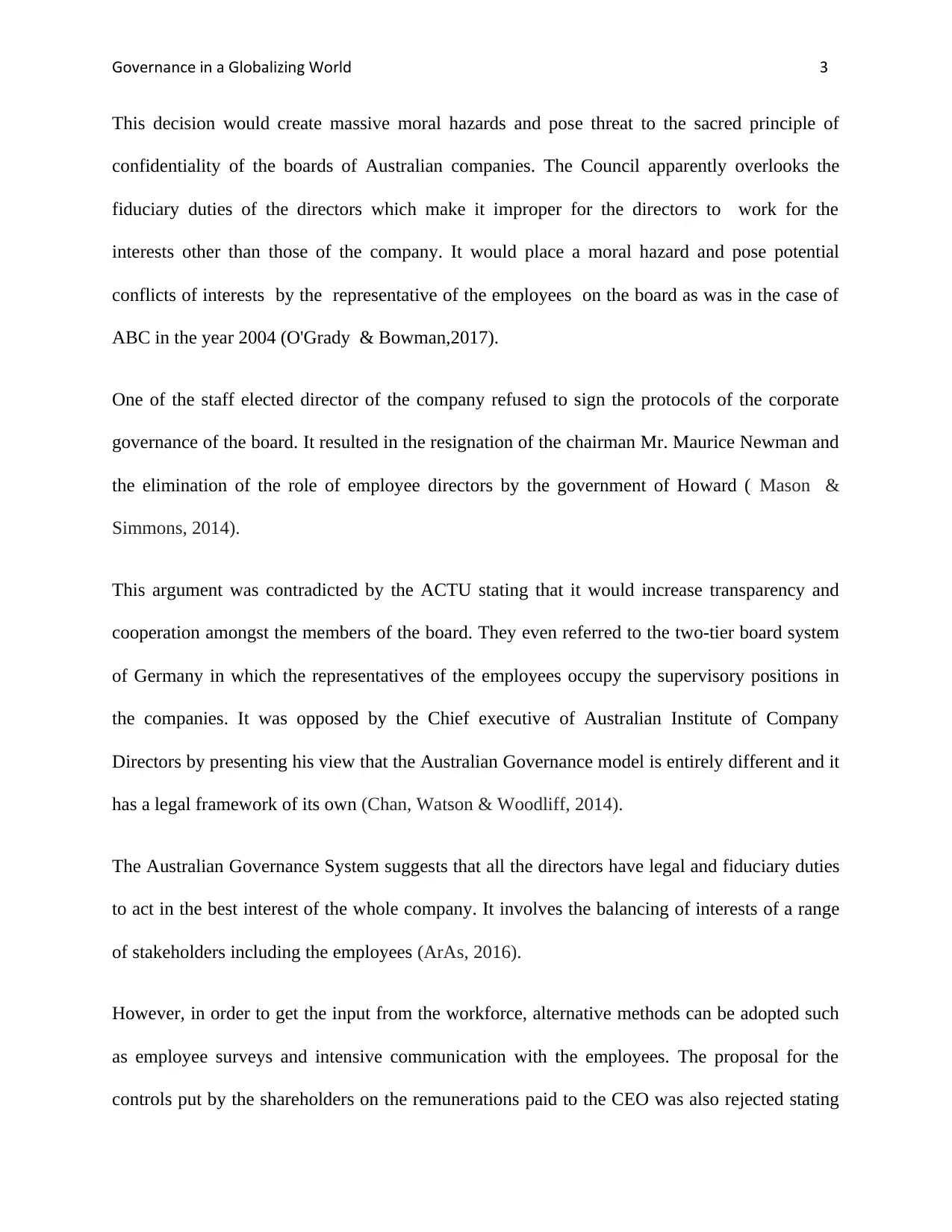
Governance in a Globalizing World 3
This decision would create massive moral hazards and pose threat to the sacred principle of
confidentiality of the boards of Australian companies. The Council apparently overlooks the
fiduciary duties of the directors which make it improper for the directors to work for the
interests other than those of the company. It would place a moral hazard and pose potential
conflicts of interests by the representative of the employees on the board as was in the case of
ABC in the year 2004 (O'Grady & Bowman,2017).
One of the staff elected director of the company refused to sign the protocols of the corporate
governance of the board. It resulted in the resignation of the chairman Mr. Maurice Newman and
the elimination of the role of employee directors by the government of Howard ( Mason &
Simmons, 2014).
This argument was contradicted by the ACTU stating that it would increase transparency and
cooperation amongst the members of the board. They even referred to the two-tier board system
of Germany in which the representatives of the employees occupy the supervisory positions in
the companies. It was opposed by the Chief executive of Australian Institute of Company
Directors by presenting his view that the Australian Governance model is entirely different and it
has a legal framework of its own (Chan, Watson & Woodliff, 2014).
The Australian Governance System suggests that all the directors have legal and fiduciary duties
to act in the best interest of the whole company. It involves the balancing of interests of a range
of stakeholders including the employees (ArAs, 2016).
However, in order to get the input from the workforce, alternative methods can be adopted such
as employee surveys and intensive communication with the employees. The proposal for the
controls put by the shareholders on the remunerations paid to the CEO was also rejected stating
This decision would create massive moral hazards and pose threat to the sacred principle of
confidentiality of the boards of Australian companies. The Council apparently overlooks the
fiduciary duties of the directors which make it improper for the directors to work for the
interests other than those of the company. It would place a moral hazard and pose potential
conflicts of interests by the representative of the employees on the board as was in the case of
ABC in the year 2004 (O'Grady & Bowman,2017).
One of the staff elected director of the company refused to sign the protocols of the corporate
governance of the board. It resulted in the resignation of the chairman Mr. Maurice Newman and
the elimination of the role of employee directors by the government of Howard ( Mason &
Simmons, 2014).
This argument was contradicted by the ACTU stating that it would increase transparency and
cooperation amongst the members of the board. They even referred to the two-tier board system
of Germany in which the representatives of the employees occupy the supervisory positions in
the companies. It was opposed by the Chief executive of Australian Institute of Company
Directors by presenting his view that the Australian Governance model is entirely different and it
has a legal framework of its own (Chan, Watson & Woodliff, 2014).
The Australian Governance System suggests that all the directors have legal and fiduciary duties
to act in the best interest of the whole company. It involves the balancing of interests of a range
of stakeholders including the employees (ArAs, 2016).
However, in order to get the input from the workforce, alternative methods can be adopted such
as employee surveys and intensive communication with the employees. The proposal for the
controls put by the shareholders on the remunerations paid to the CEO was also rejected stating
Paraphrase This Document
Need a fresh take? Get an instant paraphrase of this document with our AI Paraphraser
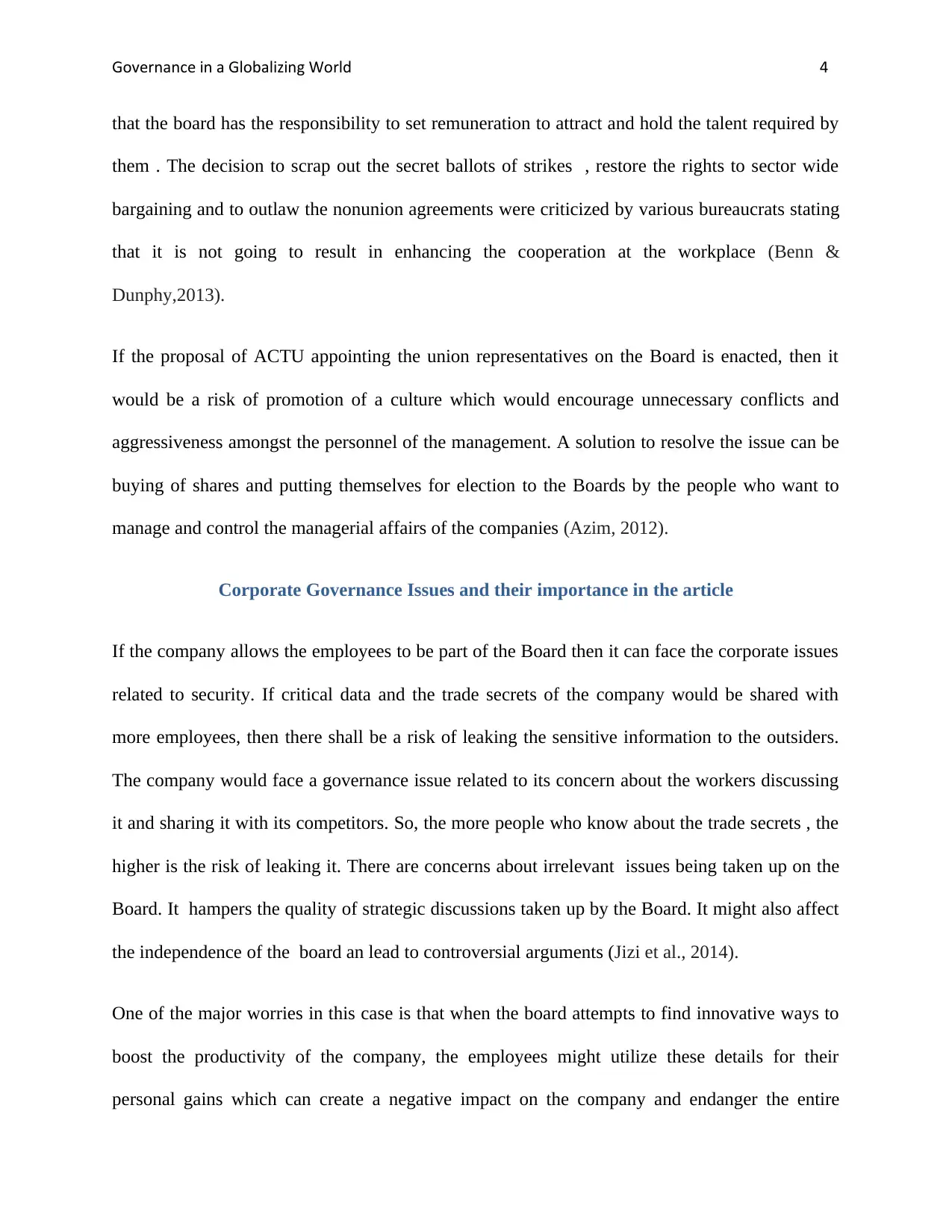
Governance in a Globalizing World 4
that the board has the responsibility to set remuneration to attract and hold the talent required by
them . The decision to scrap out the secret ballots of strikes , restore the rights to sector wide
bargaining and to outlaw the nonunion agreements were criticized by various bureaucrats stating
that it is not going to result in enhancing the cooperation at the workplace (Benn &
Dunphy,2013).
If the proposal of ACTU appointing the union representatives on the Board is enacted, then it
would be a risk of promotion of a culture which would encourage unnecessary conflicts and
aggressiveness amongst the personnel of the management. A solution to resolve the issue can be
buying of shares and putting themselves for election to the Boards by the people who want to
manage and control the managerial affairs of the companies (Azim, 2012).
Corporate Governance Issues and their importance in the article
If the company allows the employees to be part of the Board then it can face the corporate issues
related to security. If critical data and the trade secrets of the company would be shared with
more employees, then there shall be a risk of leaking the sensitive information to the outsiders.
The company would face a governance issue related to its concern about the workers discussing
it and sharing it with its competitors. So, the more people who know about the trade secrets , the
higher is the risk of leaking it. There are concerns about irrelevant issues being taken up on the
Board. It hampers the quality of strategic discussions taken up by the Board. It might also affect
the independence of the board an lead to controversial arguments (Jizi et al., 2014).
One of the major worries in this case is that when the board attempts to find innovative ways to
boost the productivity of the company, the employees might utilize these details for their
personal gains which can create a negative impact on the company and endanger the entire
that the board has the responsibility to set remuneration to attract and hold the talent required by
them . The decision to scrap out the secret ballots of strikes , restore the rights to sector wide
bargaining and to outlaw the nonunion agreements were criticized by various bureaucrats stating
that it is not going to result in enhancing the cooperation at the workplace (Benn &
Dunphy,2013).
If the proposal of ACTU appointing the union representatives on the Board is enacted, then it
would be a risk of promotion of a culture which would encourage unnecessary conflicts and
aggressiveness amongst the personnel of the management. A solution to resolve the issue can be
buying of shares and putting themselves for election to the Boards by the people who want to
manage and control the managerial affairs of the companies (Azim, 2012).
Corporate Governance Issues and their importance in the article
If the company allows the employees to be part of the Board then it can face the corporate issues
related to security. If critical data and the trade secrets of the company would be shared with
more employees, then there shall be a risk of leaking the sensitive information to the outsiders.
The company would face a governance issue related to its concern about the workers discussing
it and sharing it with its competitors. So, the more people who know about the trade secrets , the
higher is the risk of leaking it. There are concerns about irrelevant issues being taken up on the
Board. It hampers the quality of strategic discussions taken up by the Board. It might also affect
the independence of the board an lead to controversial arguments (Jizi et al., 2014).
One of the major worries in this case is that when the board attempts to find innovative ways to
boost the productivity of the company, the employees might utilize these details for their
personal gains which can create a negative impact on the company and endanger the entire
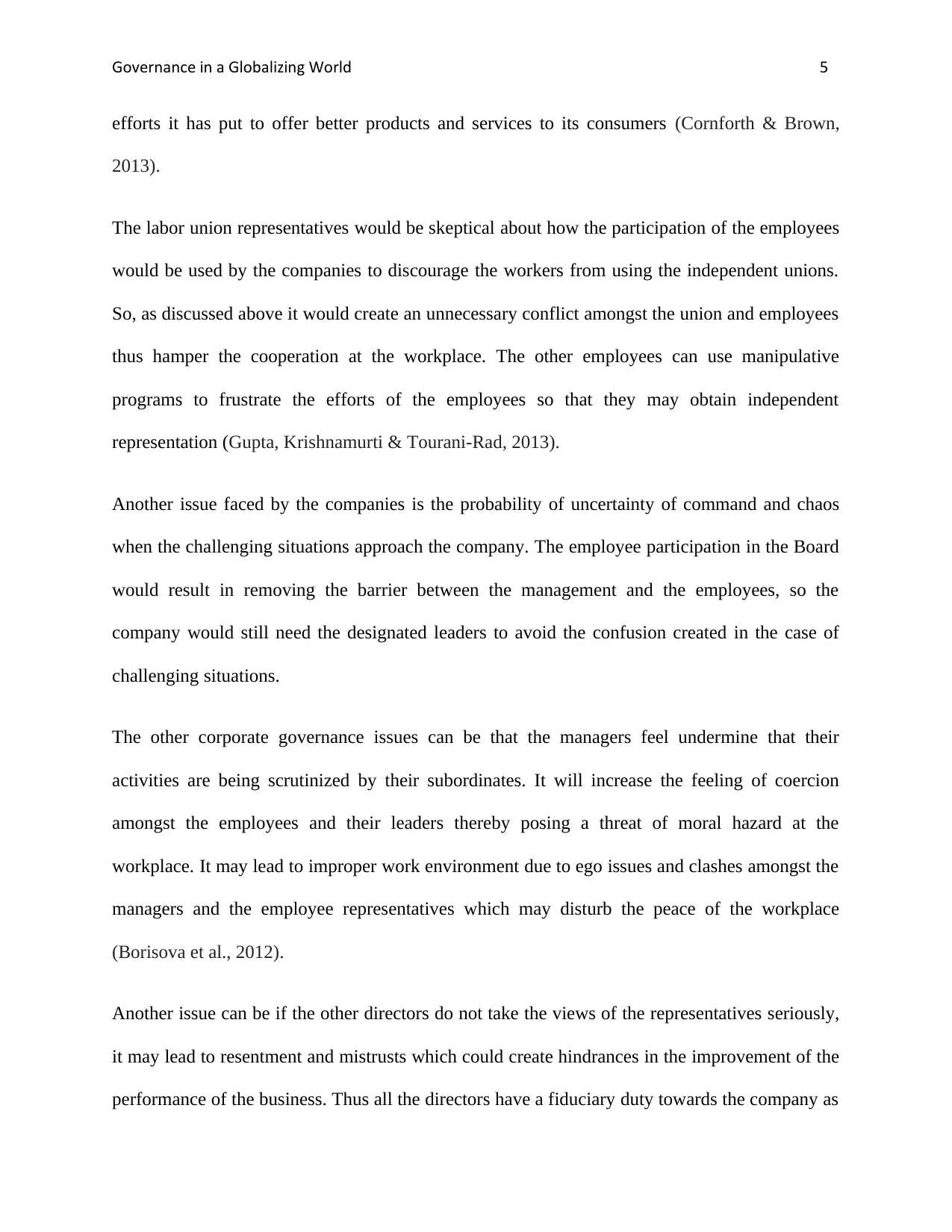
Governance in a Globalizing World 5
efforts it has put to offer better products and services to its consumers (Cornforth & Brown,
2013).
The labor union representatives would be skeptical about how the participation of the employees
would be used by the companies to discourage the workers from using the independent unions.
So, as discussed above it would create an unnecessary conflict amongst the union and employees
thus hamper the cooperation at the workplace. The other employees can use manipulative
programs to frustrate the efforts of the employees so that they may obtain independent
representation (Gupta, Krishnamurti & Tourani-Rad, 2013).
Another issue faced by the companies is the probability of uncertainty of command and chaos
when the challenging situations approach the company. The employee participation in the Board
would result in removing the barrier between the management and the employees, so the
company would still need the designated leaders to avoid the confusion created in the case of
challenging situations.
The other corporate governance issues can be that the managers feel undermine that their
activities are being scrutinized by their subordinates. It will increase the feeling of coercion
amongst the employees and their leaders thereby posing a threat of moral hazard at the
workplace. It may lead to improper work environment due to ego issues and clashes amongst the
managers and the employee representatives which may disturb the peace of the workplace
(Borisova et al., 2012).
Another issue can be if the other directors do not take the views of the representatives seriously,
it may lead to resentment and mistrusts which could create hindrances in the improvement of the
performance of the business. Thus all the directors have a fiduciary duty towards the company as
efforts it has put to offer better products and services to its consumers (Cornforth & Brown,
2013).
The labor union representatives would be skeptical about how the participation of the employees
would be used by the companies to discourage the workers from using the independent unions.
So, as discussed above it would create an unnecessary conflict amongst the union and employees
thus hamper the cooperation at the workplace. The other employees can use manipulative
programs to frustrate the efforts of the employees so that they may obtain independent
representation (Gupta, Krishnamurti & Tourani-Rad, 2013).
Another issue faced by the companies is the probability of uncertainty of command and chaos
when the challenging situations approach the company. The employee participation in the Board
would result in removing the barrier between the management and the employees, so the
company would still need the designated leaders to avoid the confusion created in the case of
challenging situations.
The other corporate governance issues can be that the managers feel undermine that their
activities are being scrutinized by their subordinates. It will increase the feeling of coercion
amongst the employees and their leaders thereby posing a threat of moral hazard at the
workplace. It may lead to improper work environment due to ego issues and clashes amongst the
managers and the employee representatives which may disturb the peace of the workplace
(Borisova et al., 2012).
Another issue can be if the other directors do not take the views of the representatives seriously,
it may lead to resentment and mistrusts which could create hindrances in the improvement of the
performance of the business. Thus all the directors have a fiduciary duty towards the company as
⊘ This is a preview!⊘
Do you want full access?
Subscribe today to unlock all pages.

Trusted by 1+ million students worldwide
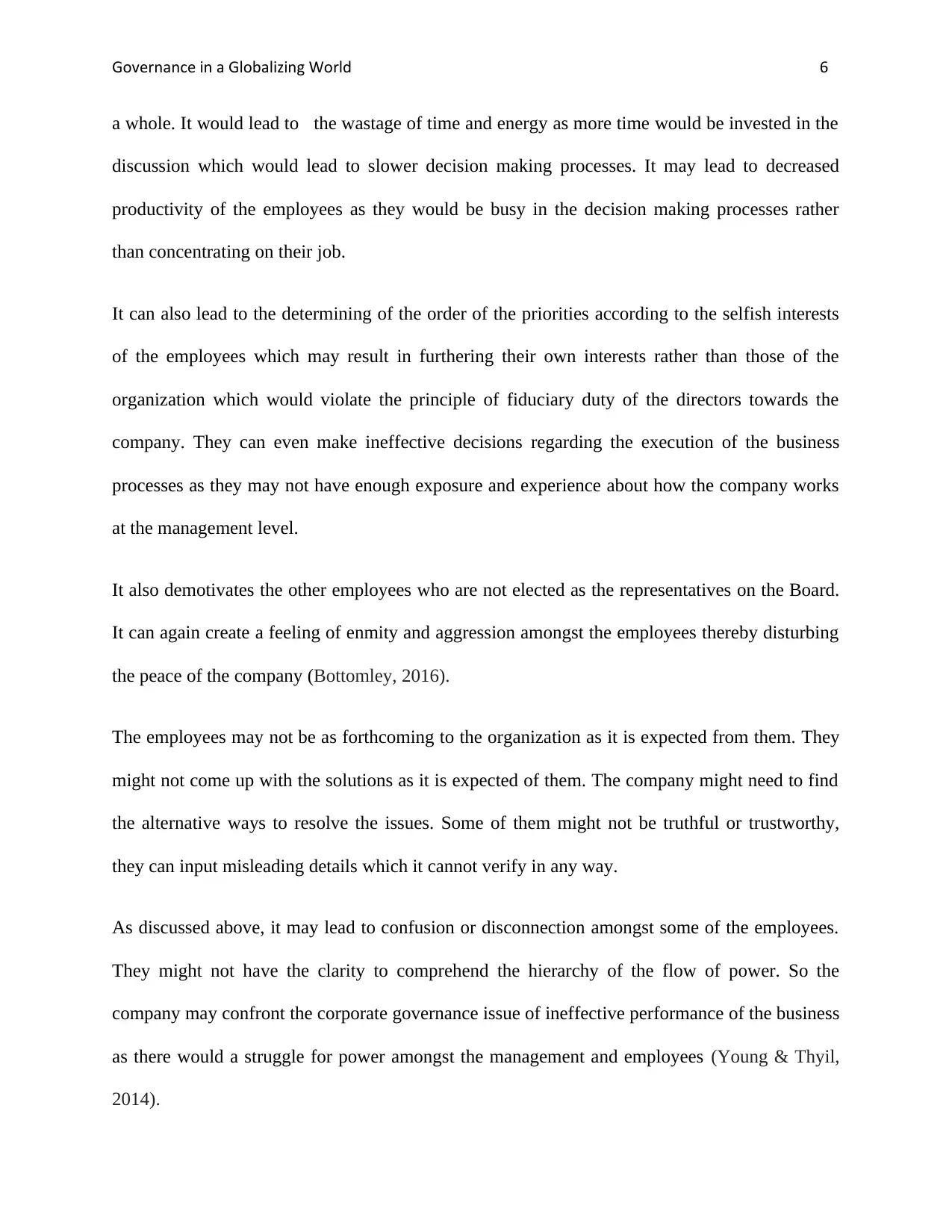
Governance in a Globalizing World 6
a whole. It would lead to the wastage of time and energy as more time would be invested in the
discussion which would lead to slower decision making processes. It may lead to decreased
productivity of the employees as they would be busy in the decision making processes rather
than concentrating on their job.
It can also lead to the determining of the order of the priorities according to the selfish interests
of the employees which may result in furthering their own interests rather than those of the
organization which would violate the principle of fiduciary duty of the directors towards the
company. They can even make ineffective decisions regarding the execution of the business
processes as they may not have enough exposure and experience about how the company works
at the management level.
It also demotivates the other employees who are not elected as the representatives on the Board.
It can again create a feeling of enmity and aggression amongst the employees thereby disturbing
the peace of the company (Bottomley, 2016).
The employees may not be as forthcoming to the organization as it is expected from them. They
might not come up with the solutions as it is expected of them. The company might need to find
the alternative ways to resolve the issues. Some of them might not be truthful or trustworthy,
they can input misleading details which it cannot verify in any way.
As discussed above, it may lead to confusion or disconnection amongst some of the employees.
They might not have the clarity to comprehend the hierarchy of the flow of power. So the
company may confront the corporate governance issue of ineffective performance of the business
as there would a struggle for power amongst the management and employees (Young & Thyil,
2014).
a whole. It would lead to the wastage of time and energy as more time would be invested in the
discussion which would lead to slower decision making processes. It may lead to decreased
productivity of the employees as they would be busy in the decision making processes rather
than concentrating on their job.
It can also lead to the determining of the order of the priorities according to the selfish interests
of the employees which may result in furthering their own interests rather than those of the
organization which would violate the principle of fiduciary duty of the directors towards the
company. They can even make ineffective decisions regarding the execution of the business
processes as they may not have enough exposure and experience about how the company works
at the management level.
It also demotivates the other employees who are not elected as the representatives on the Board.
It can again create a feeling of enmity and aggression amongst the employees thereby disturbing
the peace of the company (Bottomley, 2016).
The employees may not be as forthcoming to the organization as it is expected from them. They
might not come up with the solutions as it is expected of them. The company might need to find
the alternative ways to resolve the issues. Some of them might not be truthful or trustworthy,
they can input misleading details which it cannot verify in any way.
As discussed above, it may lead to confusion or disconnection amongst some of the employees.
They might not have the clarity to comprehend the hierarchy of the flow of power. So the
company may confront the corporate governance issue of ineffective performance of the business
as there would a struggle for power amongst the management and employees (Young & Thyil,
2014).
Paraphrase This Document
Need a fresh take? Get an instant paraphrase of this document with our AI Paraphraser
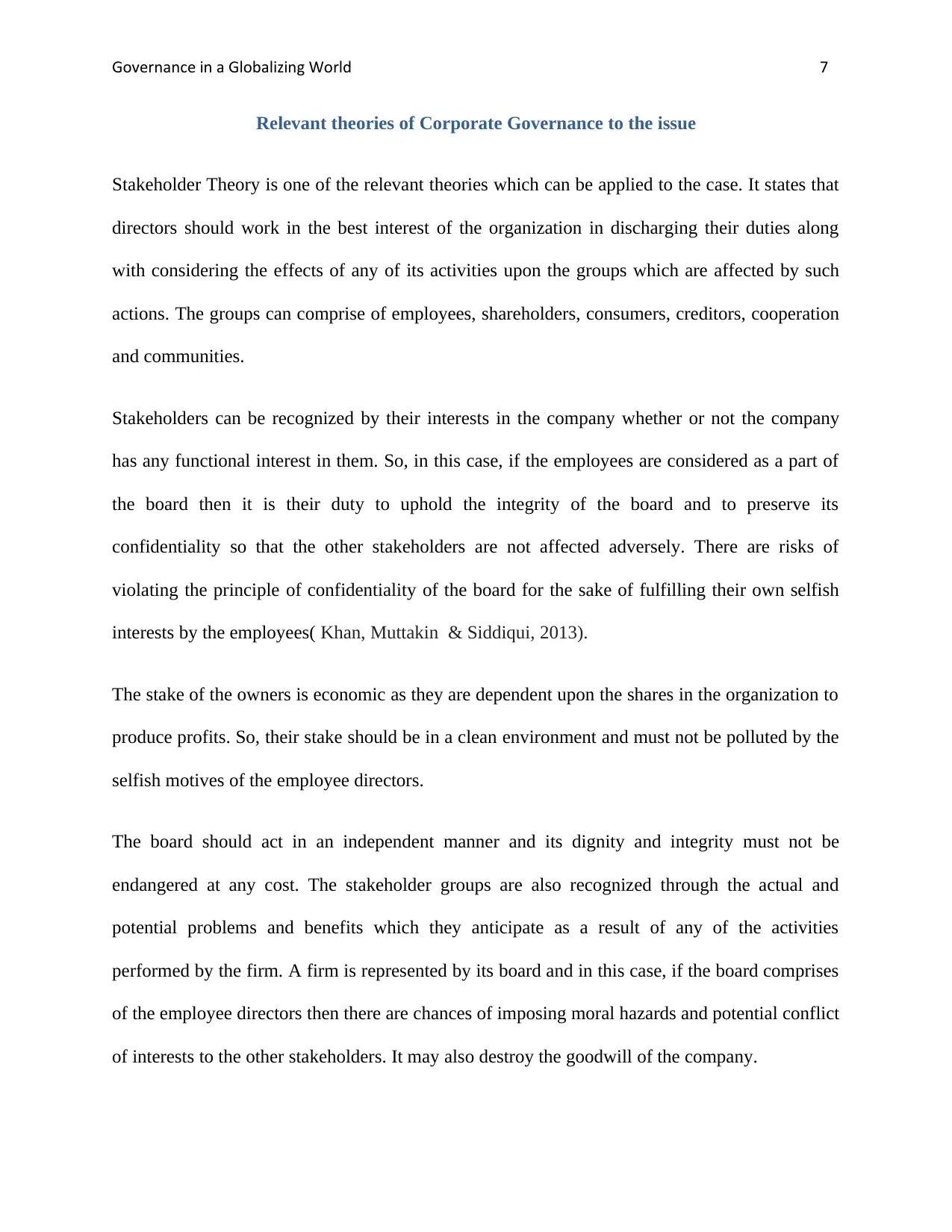
Governance in a Globalizing World 7
Relevant theories of Corporate Governance to the issue
Stakeholder Theory is one of the relevant theories which can be applied to the case. It states that
directors should work in the best interest of the organization in discharging their duties along
with considering the effects of any of its activities upon the groups which are affected by such
actions. The groups can comprise of employees, shareholders, consumers, creditors, cooperation
and communities.
Stakeholders can be recognized by their interests in the company whether or not the company
has any functional interest in them. So, in this case, if the employees are considered as a part of
the board then it is their duty to uphold the integrity of the board and to preserve its
confidentiality so that the other stakeholders are not affected adversely. There are risks of
violating the principle of confidentiality of the board for the sake of fulfilling their own selfish
interests by the employees( Khan, Muttakin & Siddiqui, 2013).
The stake of the owners is economic as they are dependent upon the shares in the organization to
produce profits. So, their stake should be in a clean environment and must not be polluted by the
selfish motives of the employee directors.
The board should act in an independent manner and its dignity and integrity must not be
endangered at any cost. The stakeholder groups are also recognized through the actual and
potential problems and benefits which they anticipate as a result of any of the activities
performed by the firm. A firm is represented by its board and in this case, if the board comprises
of the employee directors then there are chances of imposing moral hazards and potential conflict
of interests to the other stakeholders. It may also destroy the goodwill of the company.
Relevant theories of Corporate Governance to the issue
Stakeholder Theory is one of the relevant theories which can be applied to the case. It states that
directors should work in the best interest of the organization in discharging their duties along
with considering the effects of any of its activities upon the groups which are affected by such
actions. The groups can comprise of employees, shareholders, consumers, creditors, cooperation
and communities.
Stakeholders can be recognized by their interests in the company whether or not the company
has any functional interest in them. So, in this case, if the employees are considered as a part of
the board then it is their duty to uphold the integrity of the board and to preserve its
confidentiality so that the other stakeholders are not affected adversely. There are risks of
violating the principle of confidentiality of the board for the sake of fulfilling their own selfish
interests by the employees( Khan, Muttakin & Siddiqui, 2013).
The stake of the owners is economic as they are dependent upon the shares in the organization to
produce profits. So, their stake should be in a clean environment and must not be polluted by the
selfish motives of the employee directors.
The board should act in an independent manner and its dignity and integrity must not be
endangered at any cost. The stakeholder groups are also recognized through the actual and
potential problems and benefits which they anticipate as a result of any of the activities
performed by the firm. A firm is represented by its board and in this case, if the board comprises
of the employee directors then there are chances of imposing moral hazards and potential conflict
of interests to the other stakeholders. It may also destroy the goodwill of the company.
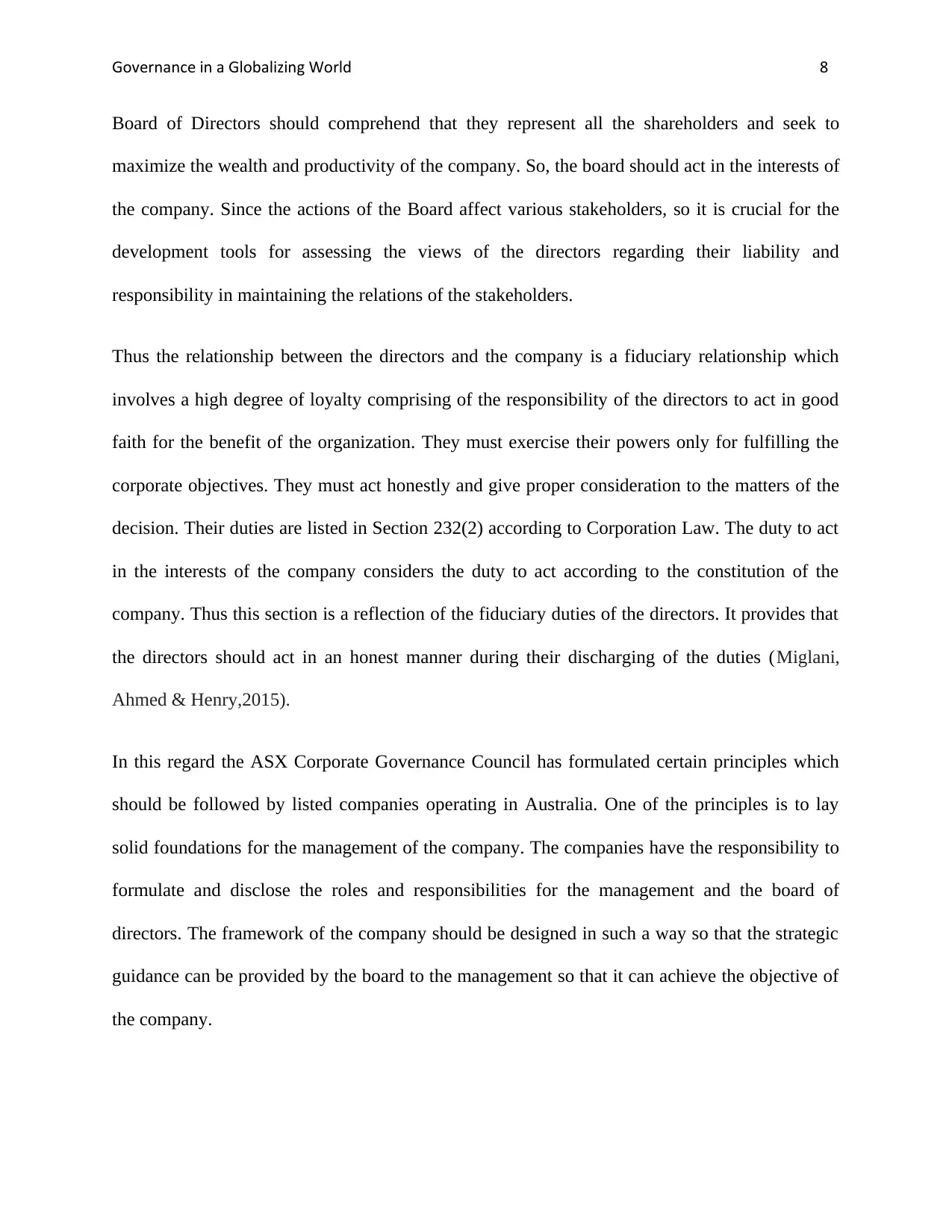
Governance in a Globalizing World 8
Board of Directors should comprehend that they represent all the shareholders and seek to
maximize the wealth and productivity of the company. So, the board should act in the interests of
the company. Since the actions of the Board affect various stakeholders, so it is crucial for the
development tools for assessing the views of the directors regarding their liability and
responsibility in maintaining the relations of the stakeholders.
Thus the relationship between the directors and the company is a fiduciary relationship which
involves a high degree of loyalty comprising of the responsibility of the directors to act in good
faith for the benefit of the organization. They must exercise their powers only for fulfilling the
corporate objectives. They must act honestly and give proper consideration to the matters of the
decision. Their duties are listed in Section 232(2) according to Corporation Law. The duty to act
in the interests of the company considers the duty to act according to the constitution of the
company. Thus this section is a reflection of the fiduciary duties of the directors. It provides that
the directors should act in an honest manner during their discharging of the duties (Miglani,
Ahmed & Henry,2015).
In this regard the ASX Corporate Governance Council has formulated certain principles which
should be followed by listed companies operating in Australia. One of the principles is to lay
solid foundations for the management of the company. The companies have the responsibility to
formulate and disclose the roles and responsibilities for the management and the board of
directors. The framework of the company should be designed in such a way so that the strategic
guidance can be provided by the board to the management so that it can achieve the objective of
the company.
Board of Directors should comprehend that they represent all the shareholders and seek to
maximize the wealth and productivity of the company. So, the board should act in the interests of
the company. Since the actions of the Board affect various stakeholders, so it is crucial for the
development tools for assessing the views of the directors regarding their liability and
responsibility in maintaining the relations of the stakeholders.
Thus the relationship between the directors and the company is a fiduciary relationship which
involves a high degree of loyalty comprising of the responsibility of the directors to act in good
faith for the benefit of the organization. They must exercise their powers only for fulfilling the
corporate objectives. They must act honestly and give proper consideration to the matters of the
decision. Their duties are listed in Section 232(2) according to Corporation Law. The duty to act
in the interests of the company considers the duty to act according to the constitution of the
company. Thus this section is a reflection of the fiduciary duties of the directors. It provides that
the directors should act in an honest manner during their discharging of the duties (Miglani,
Ahmed & Henry,2015).
In this regard the ASX Corporate Governance Council has formulated certain principles which
should be followed by listed companies operating in Australia. One of the principles is to lay
solid foundations for the management of the company. The companies have the responsibility to
formulate and disclose the roles and responsibilities for the management and the board of
directors. The framework of the company should be designed in such a way so that the strategic
guidance can be provided by the board to the management so that it can achieve the objective of
the company.
⊘ This is a preview!⊘
Do you want full access?
Subscribe today to unlock all pages.

Trusted by 1+ million students worldwide
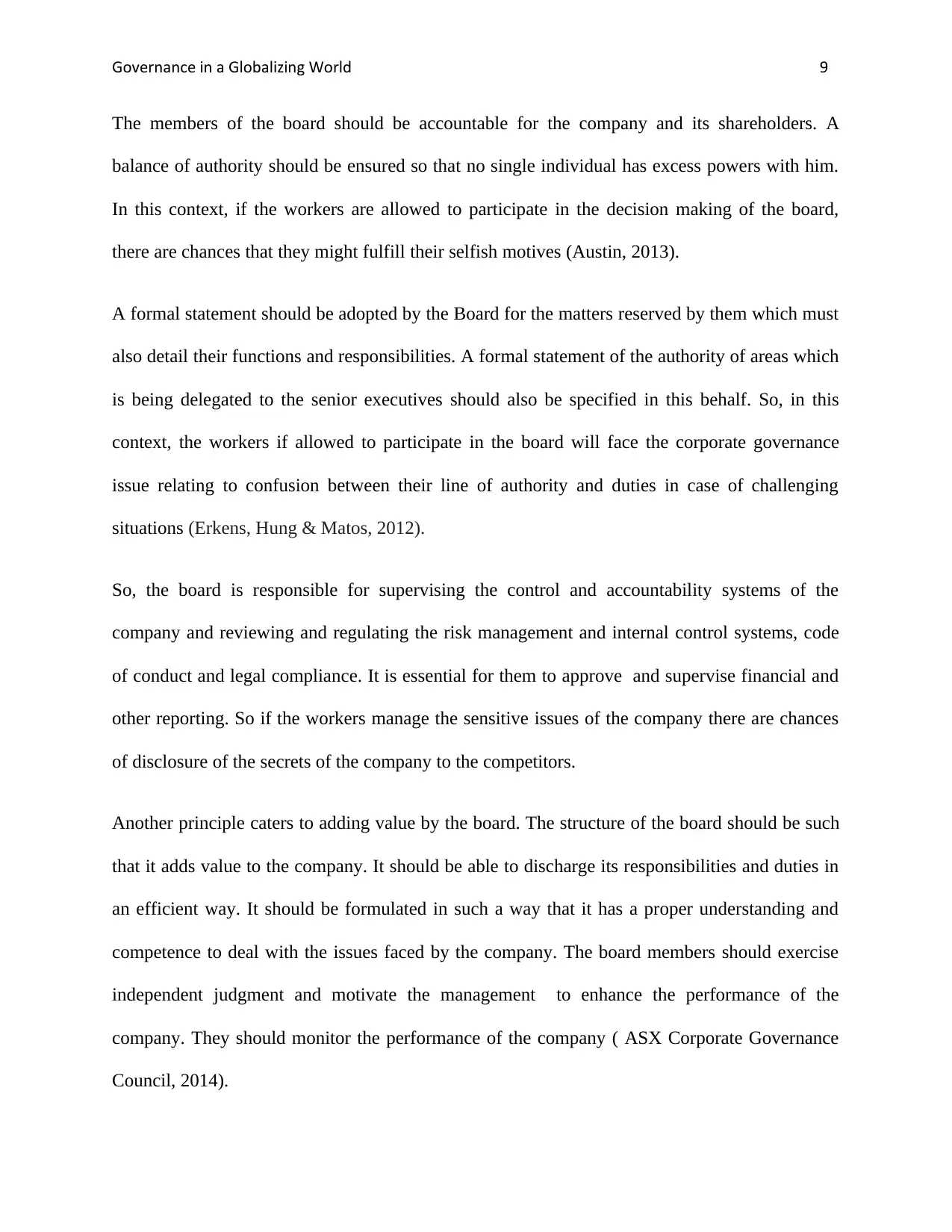
Governance in a Globalizing World 9
The members of the board should be accountable for the company and its shareholders. A
balance of authority should be ensured so that no single individual has excess powers with him.
In this context, if the workers are allowed to participate in the decision making of the board,
there are chances that they might fulfill their selfish motives (Austin, 2013).
A formal statement should be adopted by the Board for the matters reserved by them which must
also detail their functions and responsibilities. A formal statement of the authority of areas which
is being delegated to the senior executives should also be specified in this behalf. So, in this
context, the workers if allowed to participate in the board will face the corporate governance
issue relating to confusion between their line of authority and duties in case of challenging
situations (Erkens, Hung & Matos, 2012).
So, the board is responsible for supervising the control and accountability systems of the
company and reviewing and regulating the risk management and internal control systems, code
of conduct and legal compliance. It is essential for them to approve and supervise financial and
other reporting. So if the workers manage the sensitive issues of the company there are chances
of disclosure of the secrets of the company to the competitors.
Another principle caters to adding value by the board. The structure of the board should be such
that it adds value to the company. It should be able to discharge its responsibilities and duties in
an efficient way. It should be formulated in such a way that it has a proper understanding and
competence to deal with the issues faced by the company. The board members should exercise
independent judgment and motivate the management to enhance the performance of the
company. They should monitor the performance of the company ( ASX Corporate Governance
Council, 2014).
The members of the board should be accountable for the company and its shareholders. A
balance of authority should be ensured so that no single individual has excess powers with him.
In this context, if the workers are allowed to participate in the decision making of the board,
there are chances that they might fulfill their selfish motives (Austin, 2013).
A formal statement should be adopted by the Board for the matters reserved by them which must
also detail their functions and responsibilities. A formal statement of the authority of areas which
is being delegated to the senior executives should also be specified in this behalf. So, in this
context, the workers if allowed to participate in the board will face the corporate governance
issue relating to confusion between their line of authority and duties in case of challenging
situations (Erkens, Hung & Matos, 2012).
So, the board is responsible for supervising the control and accountability systems of the
company and reviewing and regulating the risk management and internal control systems, code
of conduct and legal compliance. It is essential for them to approve and supervise financial and
other reporting. So if the workers manage the sensitive issues of the company there are chances
of disclosure of the secrets of the company to the competitors.
Another principle caters to adding value by the board. The structure of the board should be such
that it adds value to the company. It should be able to discharge its responsibilities and duties in
an efficient way. It should be formulated in such a way that it has a proper understanding and
competence to deal with the issues faced by the company. The board members should exercise
independent judgment and motivate the management to enhance the performance of the
company. They should monitor the performance of the company ( ASX Corporate Governance
Council, 2014).
Paraphrase This Document
Need a fresh take? Get an instant paraphrase of this document with our AI Paraphraser
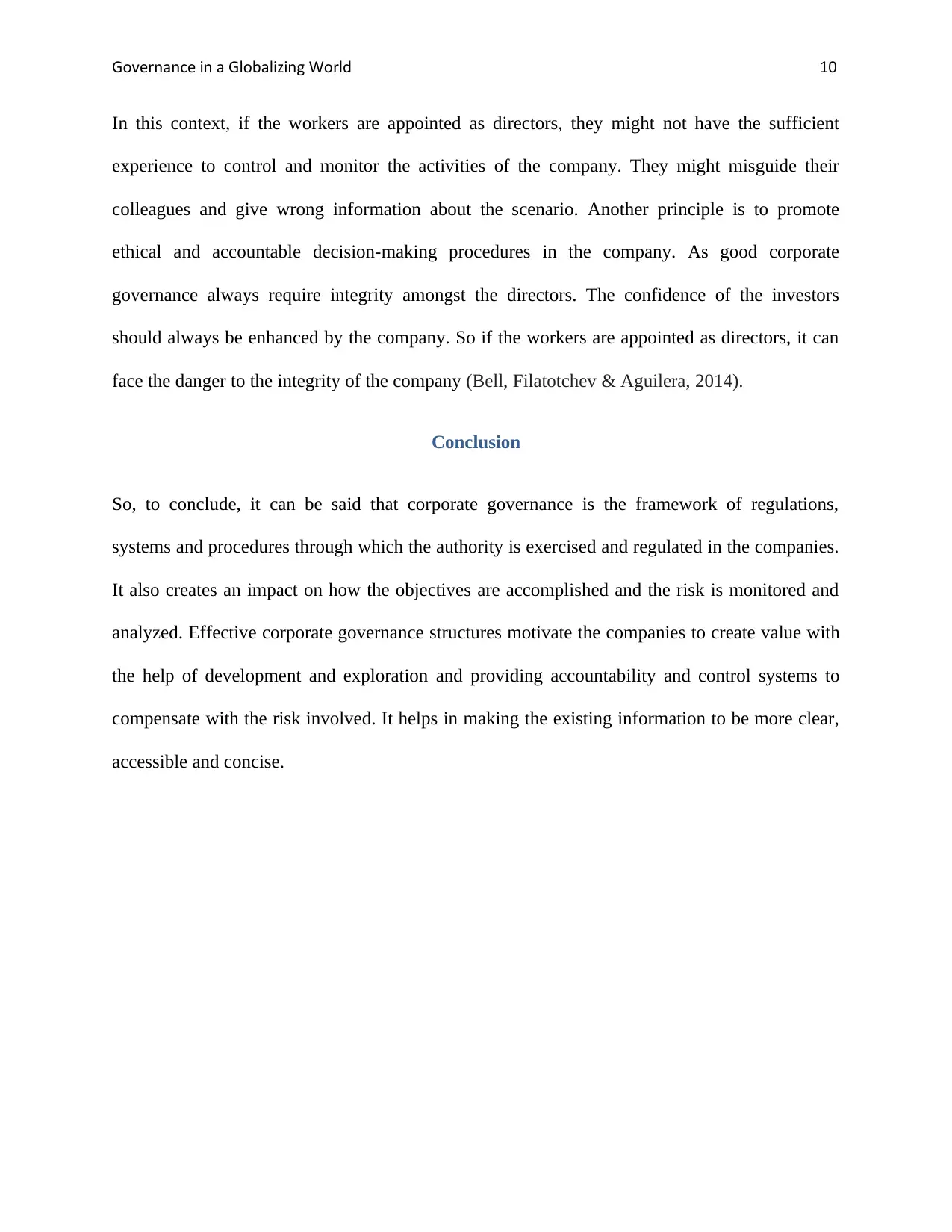
Governance in a Globalizing World 10
In this context, if the workers are appointed as directors, they might not have the sufficient
experience to control and monitor the activities of the company. They might misguide their
colleagues and give wrong information about the scenario. Another principle is to promote
ethical and accountable decision-making procedures in the company. As good corporate
governance always require integrity amongst the directors. The confidence of the investors
should always be enhanced by the company. So if the workers are appointed as directors, it can
face the danger to the integrity of the company (Bell, Filatotchev & Aguilera, 2014).
Conclusion
So, to conclude, it can be said that corporate governance is the framework of regulations,
systems and procedures through which the authority is exercised and regulated in the companies.
It also creates an impact on how the objectives are accomplished and the risk is monitored and
analyzed. Effective corporate governance structures motivate the companies to create value with
the help of development and exploration and providing accountability and control systems to
compensate with the risk involved. It helps in making the existing information to be more clear,
accessible and concise.
In this context, if the workers are appointed as directors, they might not have the sufficient
experience to control and monitor the activities of the company. They might misguide their
colleagues and give wrong information about the scenario. Another principle is to promote
ethical and accountable decision-making procedures in the company. As good corporate
governance always require integrity amongst the directors. The confidence of the investors
should always be enhanced by the company. So if the workers are appointed as directors, it can
face the danger to the integrity of the company (Bell, Filatotchev & Aguilera, 2014).
Conclusion
So, to conclude, it can be said that corporate governance is the framework of regulations,
systems and procedures through which the authority is exercised and regulated in the companies.
It also creates an impact on how the objectives are accomplished and the risk is monitored and
analyzed. Effective corporate governance structures motivate the companies to create value with
the help of development and exploration and providing accountability and control systems to
compensate with the risk involved. It helps in making the existing information to be more clear,
accessible and concise.
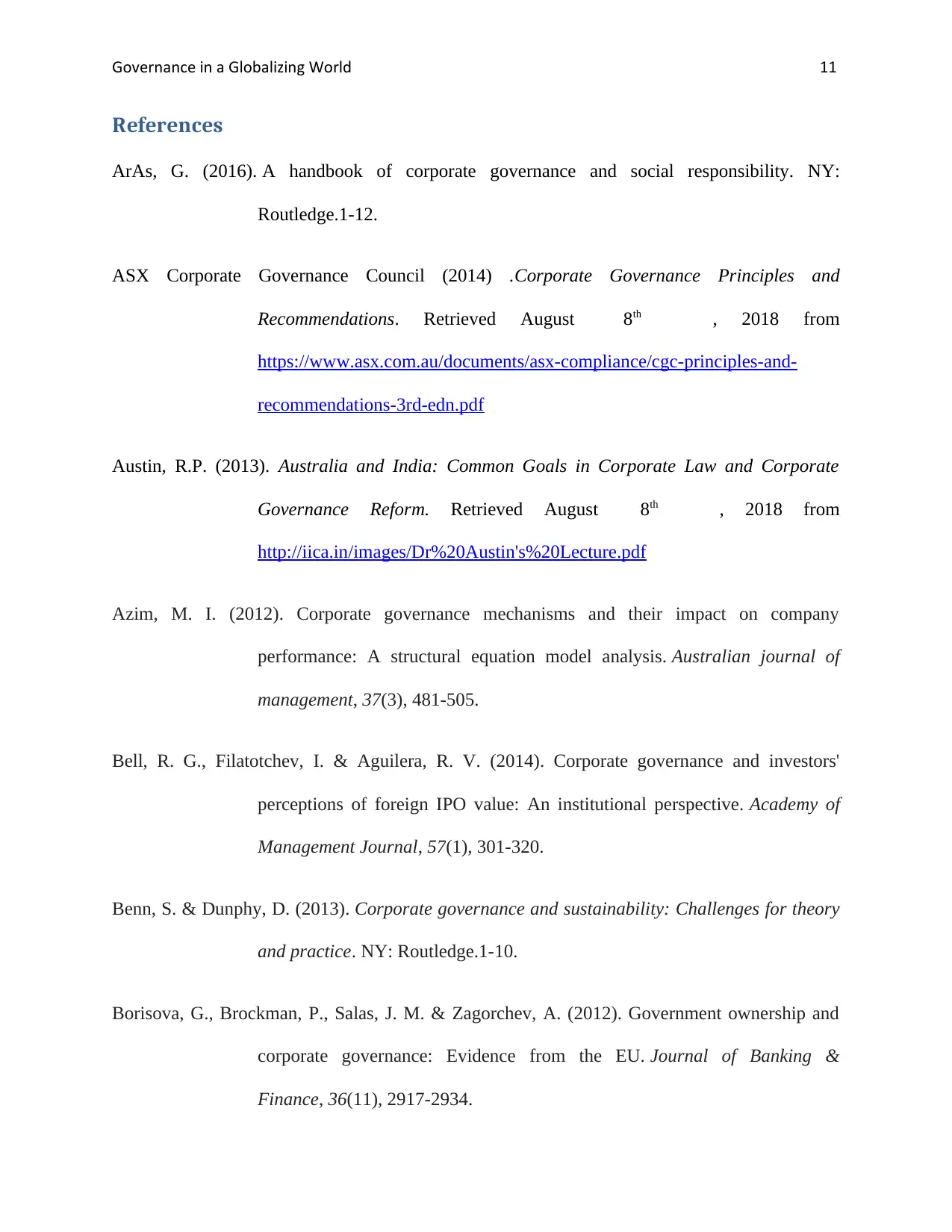
Governance in a Globalizing World 11
References
ArAs, G. (2016). A handbook of corporate governance and social responsibility. NY:
Routledge.1-12.
ASX Corporate Governance Council (2014) .Corporate Governance Principles and
Recommendations. Retrieved August 8th , 2018 from
https://www.asx.com.au/documents/asx-compliance/cgc-principles-and-
recommendations-3rd-edn.pdf
Austin, R.P. (2013). Australia and India: Common Goals in Corporate Law and Corporate
Governance Reform. Retrieved August 8th , 2018 from
http://iica.in/images/Dr%20Austin's%20Lecture.pdf
Azim, M. I. (2012). Corporate governance mechanisms and their impact on company
performance: A structural equation model analysis. Australian journal of
management, 37(3), 481-505.
Bell, R. G., Filatotchev, I. & Aguilera, R. V. (2014). Corporate governance and investors'
perceptions of foreign IPO value: An institutional perspective. Academy of
Management Journal, 57(1), 301-320.
Benn, S. & Dunphy, D. (2013). Corporate governance and sustainability: Challenges for theory
and practice. NY: Routledge.1-10.
Borisova, G., Brockman, P., Salas, J. M. & Zagorchev, A. (2012). Government ownership and
corporate governance: Evidence from the EU. Journal of Banking &
Finance, 36(11), 2917-2934.
References
ArAs, G. (2016). A handbook of corporate governance and social responsibility. NY:
Routledge.1-12.
ASX Corporate Governance Council (2014) .Corporate Governance Principles and
Recommendations. Retrieved August 8th , 2018 from
https://www.asx.com.au/documents/asx-compliance/cgc-principles-and-
recommendations-3rd-edn.pdf
Austin, R.P. (2013). Australia and India: Common Goals in Corporate Law and Corporate
Governance Reform. Retrieved August 8th , 2018 from
http://iica.in/images/Dr%20Austin's%20Lecture.pdf
Azim, M. I. (2012). Corporate governance mechanisms and their impact on company
performance: A structural equation model analysis. Australian journal of
management, 37(3), 481-505.
Bell, R. G., Filatotchev, I. & Aguilera, R. V. (2014). Corporate governance and investors'
perceptions of foreign IPO value: An institutional perspective. Academy of
Management Journal, 57(1), 301-320.
Benn, S. & Dunphy, D. (2013). Corporate governance and sustainability: Challenges for theory
and practice. NY: Routledge.1-10.
Borisova, G., Brockman, P., Salas, J. M. & Zagorchev, A. (2012). Government ownership and
corporate governance: Evidence from the EU. Journal of Banking &
Finance, 36(11), 2917-2934.
⊘ This is a preview!⊘
Do you want full access?
Subscribe today to unlock all pages.

Trusted by 1+ million students worldwide
1 out of 14
Related Documents
Your All-in-One AI-Powered Toolkit for Academic Success.
+13062052269
info@desklib.com
Available 24*7 on WhatsApp / Email
![[object Object]](/_next/static/media/star-bottom.7253800d.svg)
Unlock your academic potential
Copyright © 2020–2026 A2Z Services. All Rights Reserved. Developed and managed by ZUCOL.




